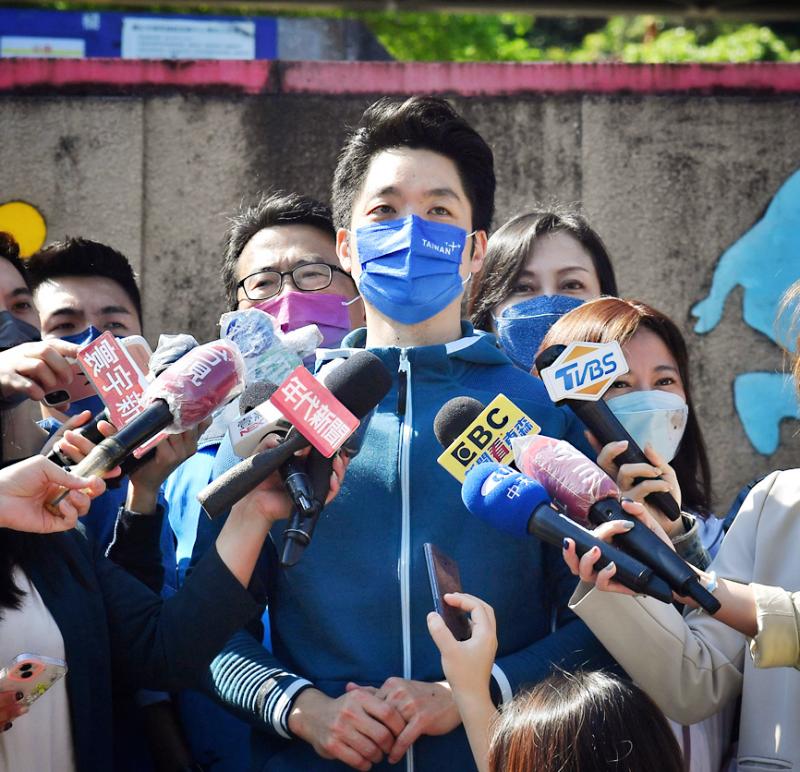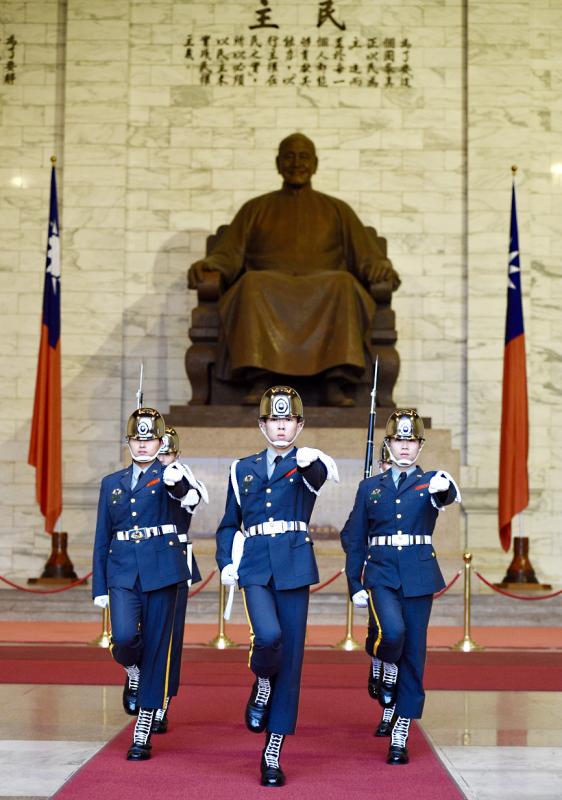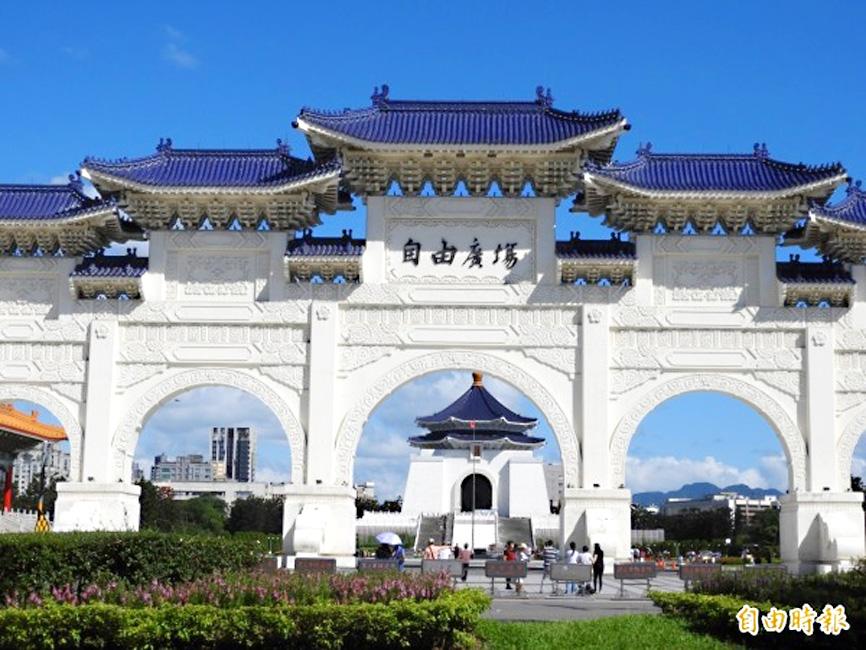Chinese Nationalist Party (KMT) Legislator Chiang Wan-an (蔣萬安) on Friday proposed changing the name of the Chiang Kai-shek Memorial Hall in Taipei to the “Taiwan Development Memorial Hall” (台灣建設紀念館), to commemorate all Taiwanese who helped build the nation over the past seven decades.
Taiwanese should look at the larger picture when determining the memorial hall’s role in history, Chiang said.
Former presidents Chiang Kai-shek (蔣介石) and his son Chiang Ching-kuo (蔣經國) protected the Republic of China and contributed greatly to the development of Taiwan during the Cold War era, an achievement that should be the goal of any political party in Taiwan, Chiang Wan-an said.

Photo: CNA
No political party or organization should seek to incite hatred or confrontation in society by their treatment or handling of places dedicated to the two former presidents, he added.
Chiang Wan-an said he believes Taiwanese would like to face the truth of the past seven decades and put it behind them, and focus on the future and moving toward it.
Chiang Wan-an is the son of former KMT vice chairman John Chiang (蔣孝嚴), who claims to be a son of Chiang Ching-kuo.

Photo: Lo Pei-der, Taipei Times
Minister of Culture Lee Yung-te (李永得) said that certain clarifications first need to be made on how the memorial hall would be rebranded, such as the fate of the statue of Chiang Kai-shek housed in the main hall and the building itself.
The Ministry of Culture stands by three main principles: first, any repurposing should remove elements suggesting reverence of authoritarian figures while retaining other historic elements, Lee said, adding that renaming the hall is an integral part of removing authoritarian elements.
Second, an effort must be made to highlight the “basic values” of Taiwan, namely having the courage to stand up against authoritarian figures, he said.

Photo: Photo: Chen Yu-fu, Taipei Times
Third, a sense of “dynamic historic views” should be established, he added.
The ministry is happy to support Chiang Wan-an’s suggestion provided all three principles are observed, Lee said, but added that renaming should be discussed with the public.
Chiang Wan-an’s comments came as a surprise to the KMT, a source in the party said yesterday, speaking on condition of anonymity
His remarks are bold and forward-thinking, but he must be prepared to endure mounting pressure from within the party, the source said.
Chiang Wan-an’s statements could benefit Taipei Deputy Mayor Vivian Huang (黃珊珊), who is rumored to be interested in running for Taipei mayor in November’s local elections, the source added.
Huang could attract 3 to 5 percent of the KMT’s voter base if she were to express her respect for Chiang Kai-shek and Chiang Ching-kuo and oppose any changes to the memorial park, the source said.
Chiang Wan-an is seen as the most likely candidate to run for Taipei mayor on the KMT ticket, although he has yet not been officially nominated.
Additional reporting by CNA

INVESTIGATION: The case is the latest instance of a DPP figure being implicated in an espionage network accused of allegedly leaking information to Chinese intelligence Democratic Progressive Party (DPP) member Ho Jen-chieh (何仁傑) was detained and held incommunicado yesterday on suspicion of spying for China during his tenure as assistant to then-minister of foreign affairs Joseph Wu (吳釗燮). The Taipei District Prosecutors’ Office said Ho was implicated during its investigation into alleged spying activities by former Presidential Office consultant Wu Shang-yu (吳尚雨). Prosecutors said there is reason to believe Ho breached the National Security Act (國家安全法) by leaking classified Ministry of Foreign Affairs information to Chinese intelligence. Following interrogation, prosecutors petitioned the Taipei District Court to detain Ho, citing concerns over potential collusion or tampering of evidence. The

Seventy percent of middle and elementary schools now conduct English classes entirely in English, the Ministry of Education said, as it encourages schools nationwide to adopt this practice Minister of Education (MOE) Cheng Ying-yao (鄭英耀) is scheduled to present a report on the government’s bilingual education policy to the Legislative Yuan’s Education and Culture Committee today. The report would outline strategies aimed at expanding access to education, reducing regional disparities and improving talent cultivation. Implementation of bilingual education policies has varied across local governments, occasionally drawing public criticism. For example, some schools have required teachers of non-English subjects to pass English proficiency

NEGOTIATIONS: The US response to the countermeasures and plans Taiwan presented has been positive, including boosting procurement and investment, the president said Taiwan is included in the first group for trade negotiations with the US, President William Lai (賴清德) said yesterday, as he seeks to shield Taiwanese exporters from a 32 percent tariff. In Washington, US Trade Representative Jamieson Greer said in an interview on Fox News on Thursday that he would speak to his Taiwanese and Israeli counterparts yesterday about tariffs after holding a long discussion with the Vietnamese earlier. US President Donald Trump on Wednesday postponed punishing levies on multiple trade partners, including Taiwan, for three months after trillions of US dollars were wiped off global markets. He has maintained a 10 percent

TRADE: The premier pledged safeguards on ‘Made in Taiwan’ labeling, anti-dumping measures and stricter export controls to strengthen its position in trade talks Products labeled “made in Taiwan” must be genuinely made in Taiwan, Premier Cho Jung-tai (卓榮泰) said yesterday, vowing to enforce strict safeguards against “origin laundering” and initiate anti-dumping investigations to prevent China dumping its products in Taiwan. Cho made the remarks in a discussion session with representatives from industries in Kaohsiung. In response to the US government’s recent announcement of “reciprocal” tariffs on its trading partners, President William Lai (賴清德) and Cho last week began a series of consultations with industry leaders nationwide to gather feedback and address concerns. Taiwanese and US officials held a videoconference on Friday evening to discuss the